What the WordPress: Intimidation into Compliance?
 Aaishika S Bhattacharya
Aaishika S Bhattacharya
The Open-Source Community is in splits again, this time over a project that one would call least problematic, until now. Let’s take a deeper dive into the world’s favorite CMS, which easily powers half the internet we see today, and why it’s making waves, unfortunately for the wrong reasons.
What is WordPress?
WordPress is a content management system, CMS for short, that allows users to create, manage, and publish websites effortlessly. One does not need to know how to code to get their portfolios, blogs, or even online stores and membership platforms up and running with the platform, which is a huge reason why WordPress powers more than 861 million websites today. To give you a better idea, that’s 43.5% of the internet. WordPress's flexibility, scalability, and customizability remain unmatched, thanks to a plethora of plugins and themes that users can integrate into their websites.
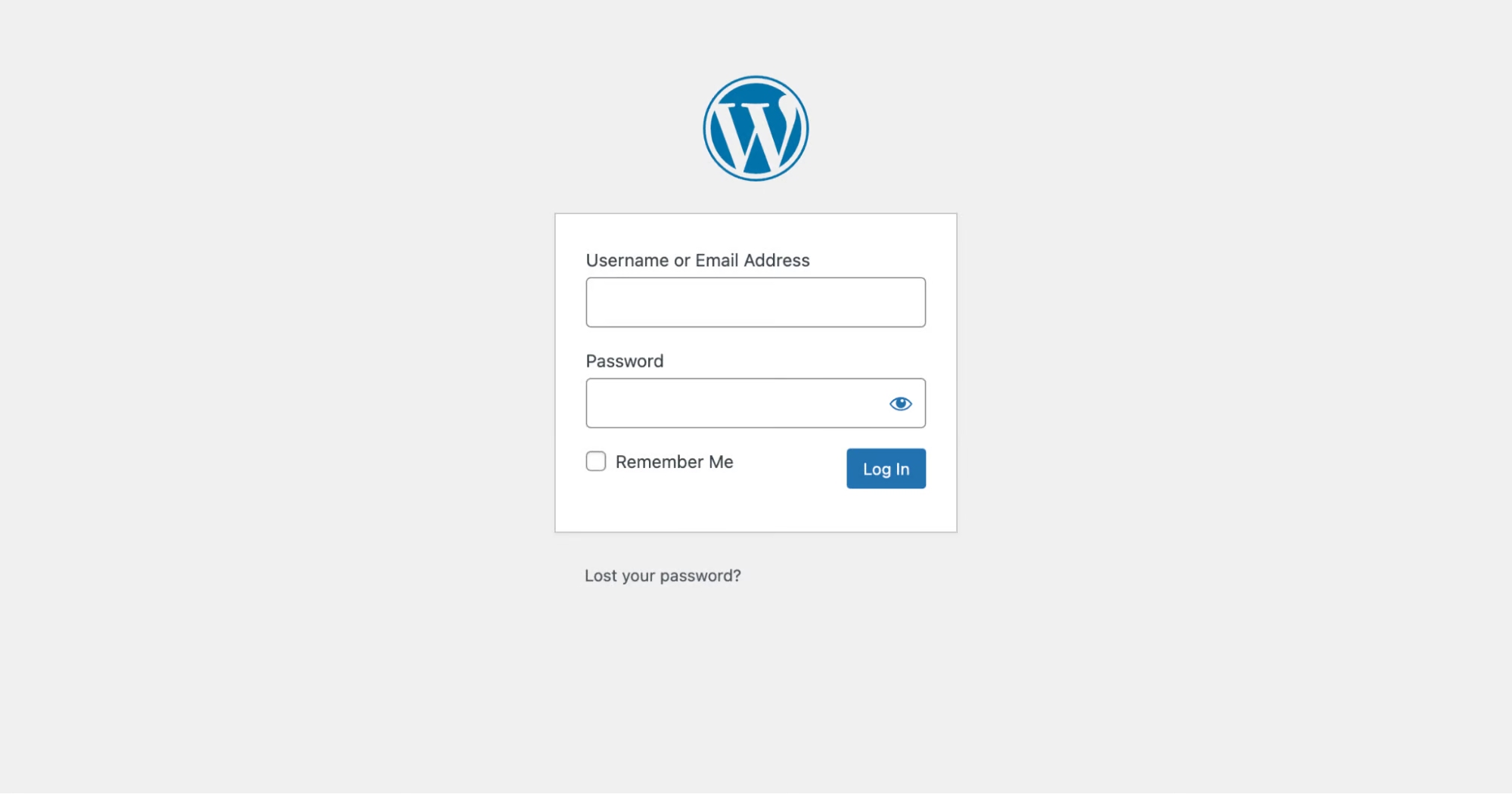
On top of all this, WordPress is also open-source, meaning anyone can make modifications and self-host WordPress, or even contribute to its core to fix vulnerabilities or add new features. Being an open-source project is key to WordPress's popularity, enabling a global community of developers to enhance its functionality and security. The result is a vast ecosystem of plugins, themes, and extensions, offering nearly endless ways to customize and extend websites, from optimizing SEO to implementing advanced security features or even creating interactive content. WordPress is designed to scale and evolve with the user’s requirements, making it one of the most versatile CMS platforms available.
Moreover, WordPress facilitates a wonderful user management interface, making allocation of roles super easy for someone who’s just getting started. Built-in blog functionality and mobile responsiveness are just cherries on top.
What is WP Engine?
WordPress can be hosted in two ways primarily:
On WordPress.com, which is the CMS’ own fully managed hosting service, OR
By self-hosting it, giving you better control over customization and performance.
The latter is what WP Engine does. WP Engine offers managed WordPress hosting, meaning they provide a hosting environment specifically optimized for WordPress, although you continue to manage WordPress and all the themes and plugins involved.
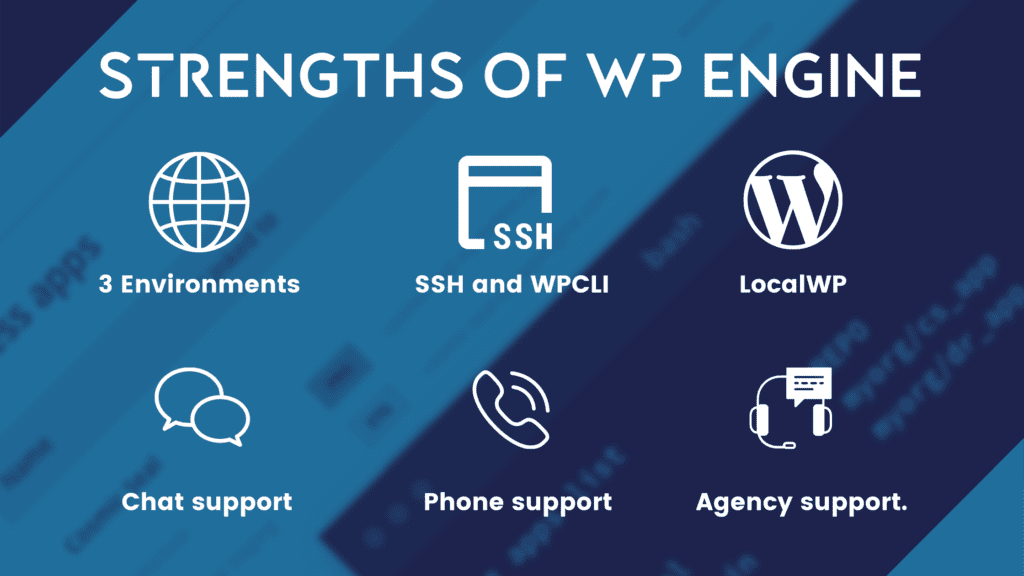
The benefit of self-hosting WordPress on managed providers is that security and performance are taken care of so you don’t have to break your head over infrastructure, and you don’t have to deal with other limitations imposed by WordPress.com around customization and flexibility, plus, no advertisements. It simply adds an extra layer of convenience for those who are not technically equipped to deal with how things work under the hood.
What Happened between WordPress and WP Engine?
Before we delve into the feud, it’s important to understand some WordPress-centric things.
Relation Between WordPress Foundation and WordPress.com
The WordPress ecosystem is divided into three different segments:
WordPress.org or WordPress - The OG Open-source Project
WordPress Foundation - Non-profit Organization backing WordPress
WordPress.com - The Managed Hosting Provider
WordPress is made available freely through the WordPress Foundation (WordPress.org) by its creator Matt Mullenweg, who also owns a company, Automattic, which owns WordPress.com, the recommended hosting platform for the CMS. WordPress.org started as an open-source project originally and continues to be a non-profit and community-driven, and WordPress.com from the house of Automattic is what makes money, as a for-profit and as a separate add-on service. Automattic despite being a separate entity, does make significant contributions to WordPress.org.
Relation Between WP Engine and WordPress
There have always been discussions on open-source forums within the WordPress ecosystem about the interactions third-party managed hosting providers have with the community around the commercial dynamic these providers have, but things took a bad turn when Matt, the creator of WordPress and CEO of Automattic, called WP Engine a “cancer to WordPress” in a blog post, mid-September.
The Feud Commences
In his blog post, Matt rightfully expressed his dissatisfaction with the way WP Engine handled certain things but used a wrong choice of words, which of course did not sit right with the organization. Most importantly, he made claims like one; that WP Engine doesn’t “contribute sufficiently” to the project, and two, that their branding “WP” confuses people into believing that it’s associated with WordPress.
In response, WP Engine was quick to send out a cease-and-desist letter to Matt and Automattic, asking for the comments to be withdrawn while stating that its use of the WordPress trademark was covered under fair use. Another interesting thing that popped up in between was that WP Engine claimed that Matt had previously reached out asking for a significant percentage (8% if the claims are true) of monthly revenue, as royalty, so the organization could continue using the WordPress trademark.
Now in retaliation, Automattic sent a cease-and-desist letter to WP Engine, stating that they had breached trademark usage guidelines for not just WordPress but WooCommerce as well, an e-commerce plugin from WordPress which is also open-source.
It did not end here, because on top of it, WordPress Foundation changed it’s trademark policy page overnight taking a direct dig at WP Engine with the following:
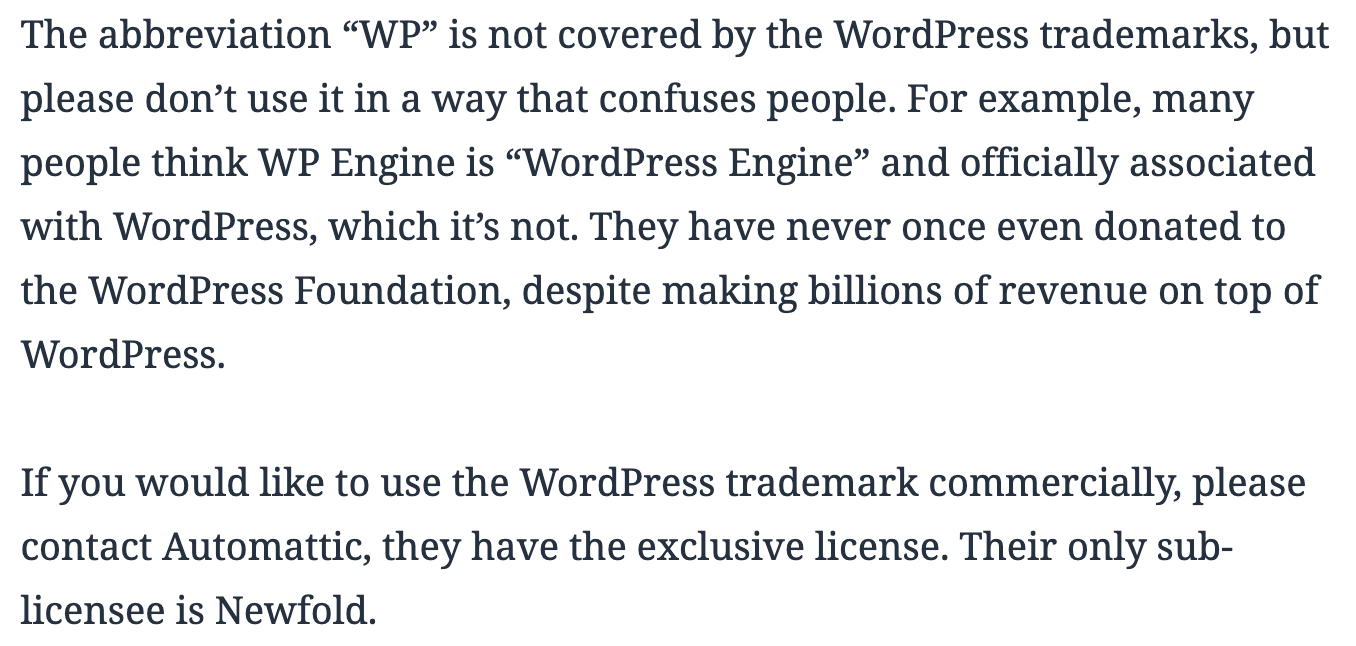
https://wordpressfoundation.org/trademark-policy/
If that wasn’t enough, Automattic then proceeded to ban WP Engine from accessing resources from WordPress.org, breaking a lot of WordPress websites hosted by the latter and disabling them from updating various elements and opening doors to vulnerabilities for quite a few sites hosted via WP Engine.
WP Engine proceeded to call out Matt Mullenweg on his tyranny with the following statement:
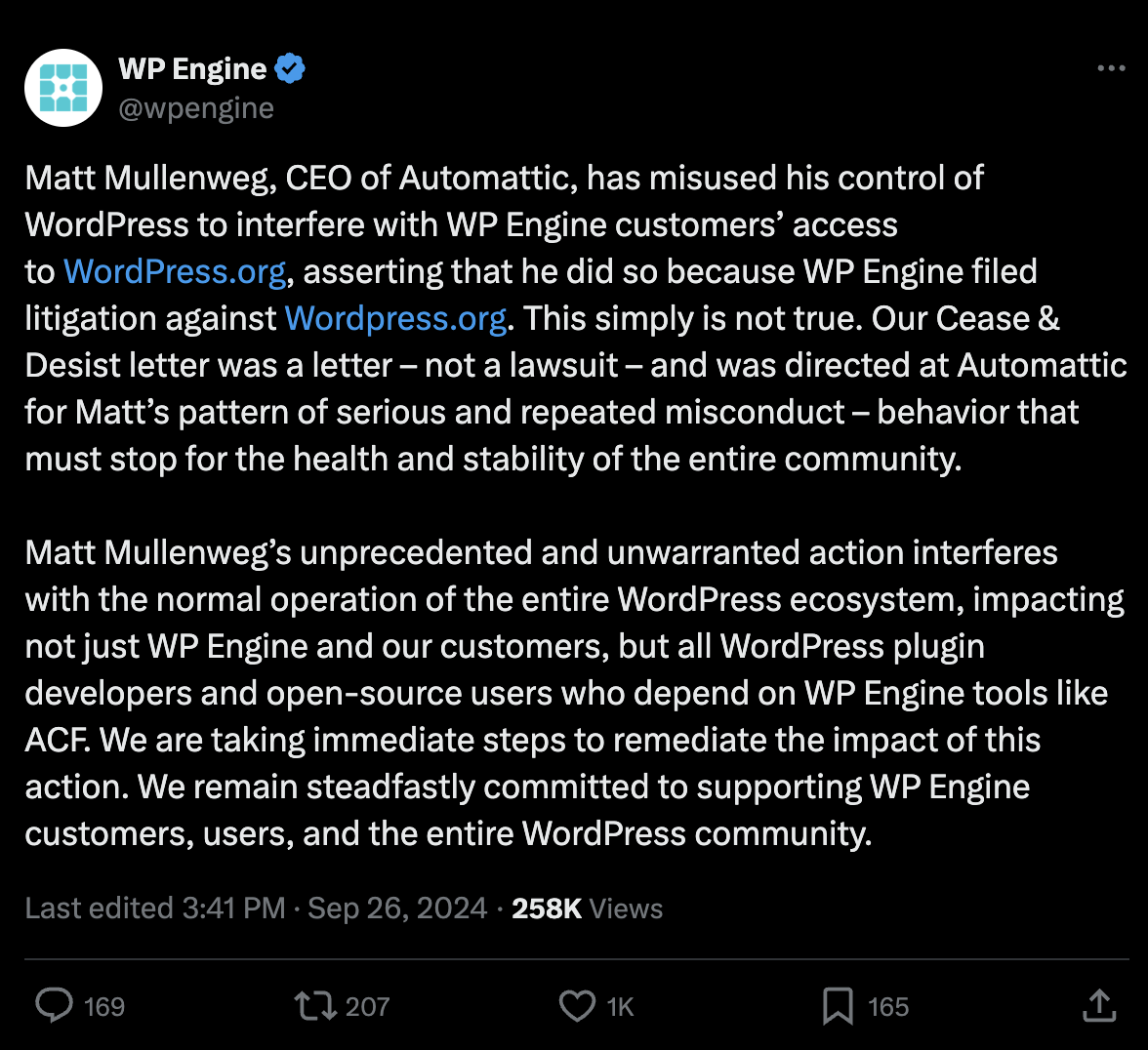
https://x.com/wpengine/status/1839246341660119287
Facing backlash from the community, the WordPress Foundation allowed WP Engine to access and update its resources until October 1. In the meantime, Matt was quick to push another blog post, stating that Automattic has been trying to strike a licensing deal for years to no avail and WP Engine has continued to defy their trademark policies throughout, which is the only basis for their issues. In the post, he also explicitly stated - “This isn’t a money grab: it’s an expectation that any business making hundreds of millions of dollars off of an open source project ought to give back, and if they don’t, then they can’t use its trademarks.”
Now a day before the ban would be applicable to WP Engine again, it updated the landing footer of its website to reflect the following, alongside removing any mentions of WordPress in its pricing plans:
“WP Engine is a proud member and supporter of the community of WordPress® users. The WordPress® trademark is the intellectual property of the WordPress Foundation, and the Woo® and WooCommerce® trademarks are the intellectual property of WooCommerce, Inc. Uses of the WordPress®, Woo®, and WooCommerce® names in this website are for identification purposes only and do not imply an endorsement by WordPress Foundation or WooCommerce, Inc. WP Engine is not endorsed or owned by, or affiliated with, the WordPress Foundation or WooCommerce, Inc.”
Moreover, an official statement was issued stating that WP Engine had changed the terms to moot Automattic’s claims.
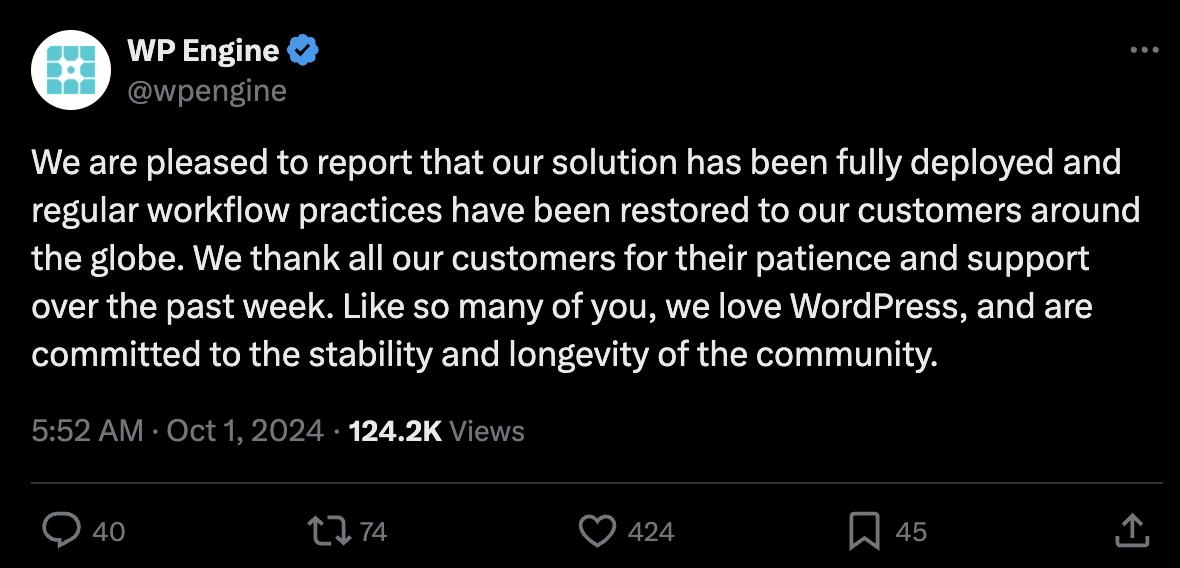
The Legal Turmoil
Eventually after all the chaos, on October 3, WP Engine proceeded to sue Automattic and its CEO Matt Mullenweg over “abuse of power”, followed by various allegations stating that WordPress, despite being open-source, wasn’t being run like one.
“Matt Mullenweg’s conduct over the last ten days has exposed significant conflicts of interest and governance issues that, if left unchecked, threaten to destroy that trust. WP Engine has no choice but to pursue these claims to protect its people, agency partners, customers, and the broader WordPress community,” WP Engine was quoted as saying by TechCrunch.
If that wasn’t interesting enough, on October 9, Matt Mullenweg dropped a bomb on WordPress.org. All the contributors now had to tick a checkbox on the contributor login page stating that they weren’t affiliated with WP Engine in any way.
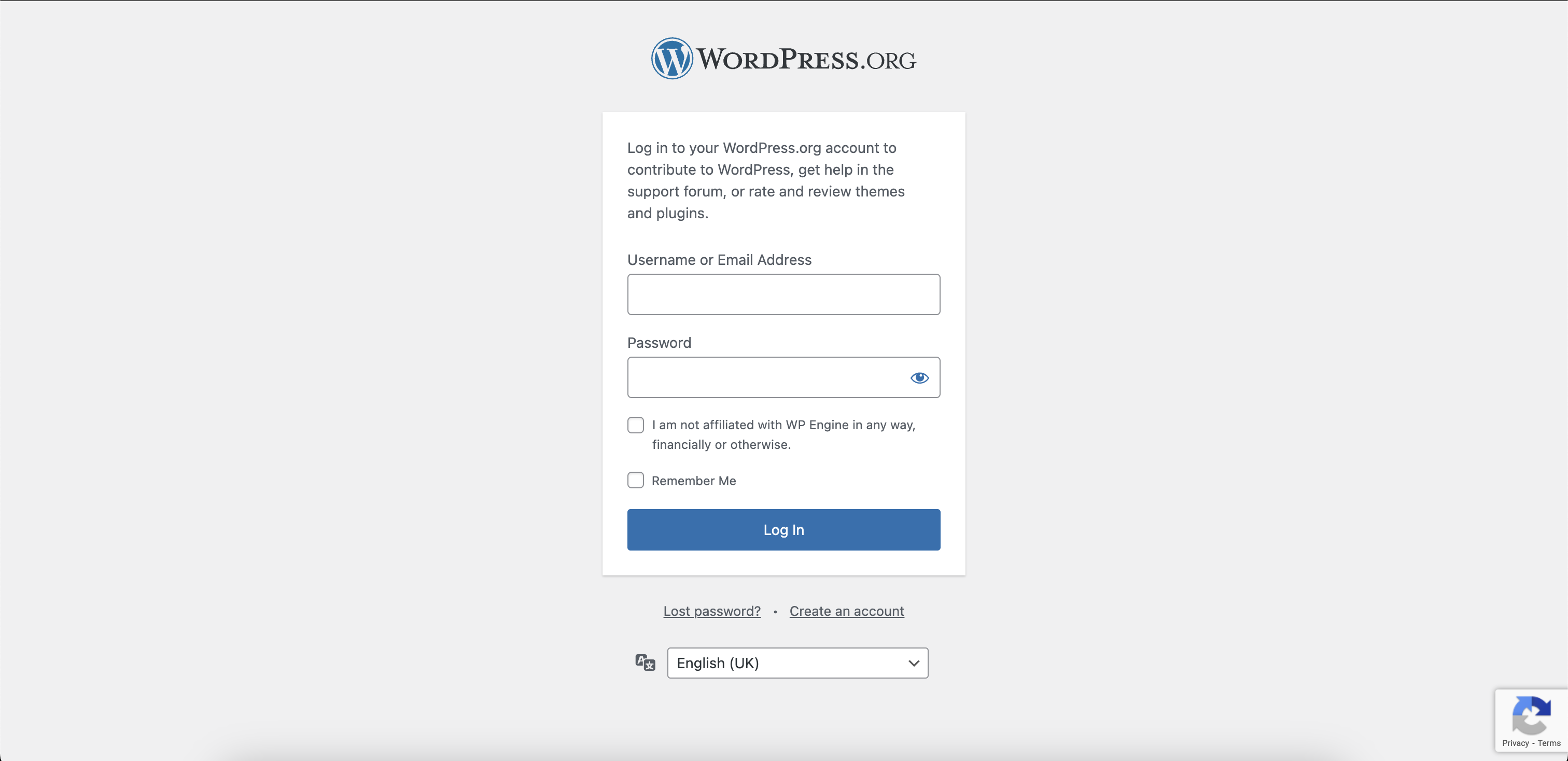
In response, WP Engine released another statement, in an attempt to protect contributors of the WordPress Foundation.
“Like the rest of the community, we have seen a new checkbox for logins at http://WordPress.org that has created confusion amongst the community as to whether or how they are obliged to answer the question posed next to the checkbox. We value our customers, agencies, users and the community as a whole, none of whom are affiliates of WP Engine.”
What is the Open-Source Community’s Take?
If Automattic's actions weren’t already frustrating WordPress contributors, Matt Mullenweg's interactions in the community Slack further escalated tensions. His firm, almost authoritarian stance on the issues led to growing discontent, with numerous members leaving the community and others being banned for simply questioning his decisions or the direction he was taking. Here are some screengrabs of legitimate contributors being removed from the forum for asking questions:
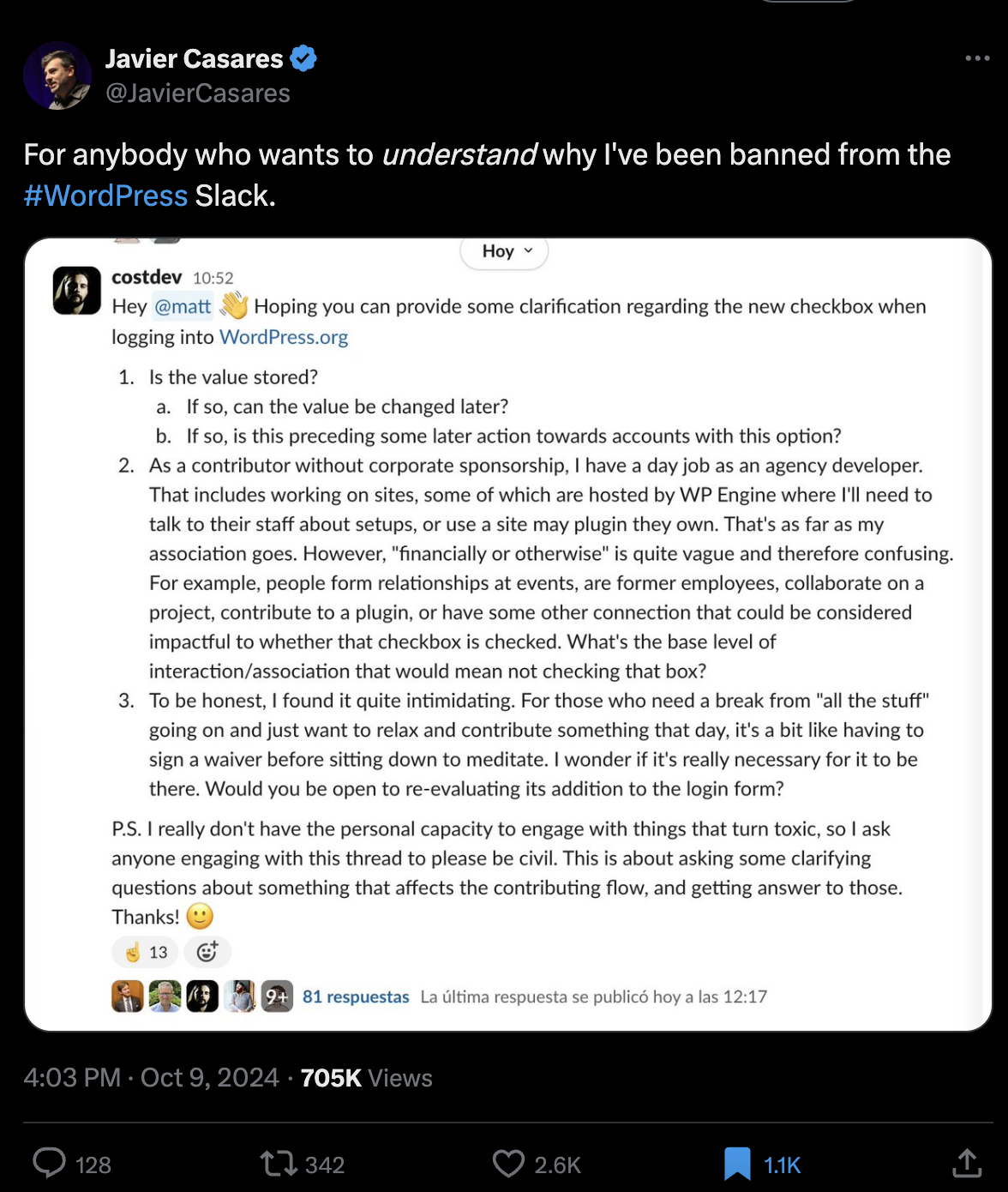
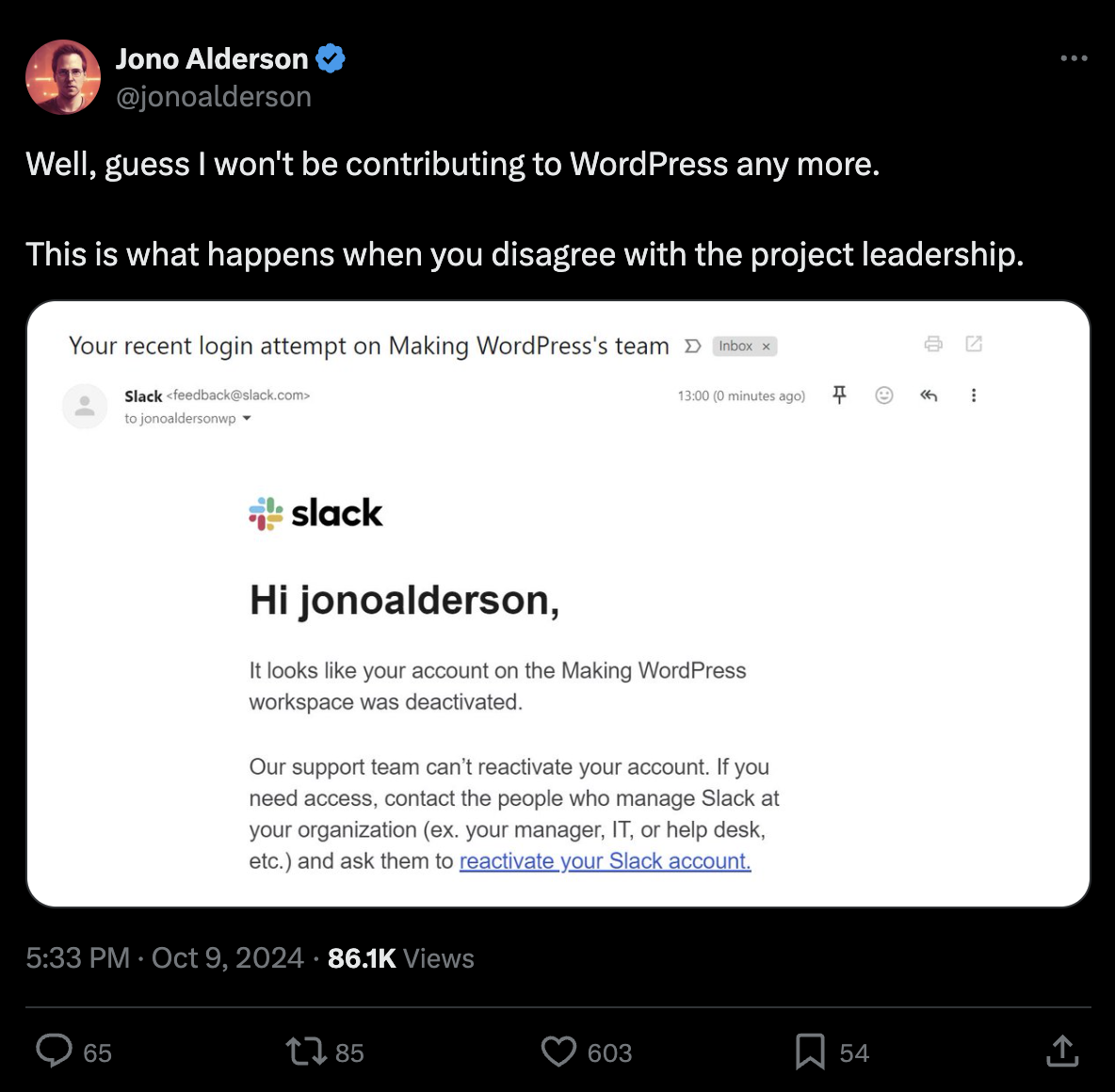
The breaking point for many contributors was the introduction of the controversial checkbox, after which many people started voicing their opinions on other platforms, most popularly X (formerly Twitter). As the feud embroils, more and more people are siding with WP Engine given that they haven’t received a concrete explanation themselves on how they can use the trademark. Meanwhile, here’s how WordPress is handling it on social media:
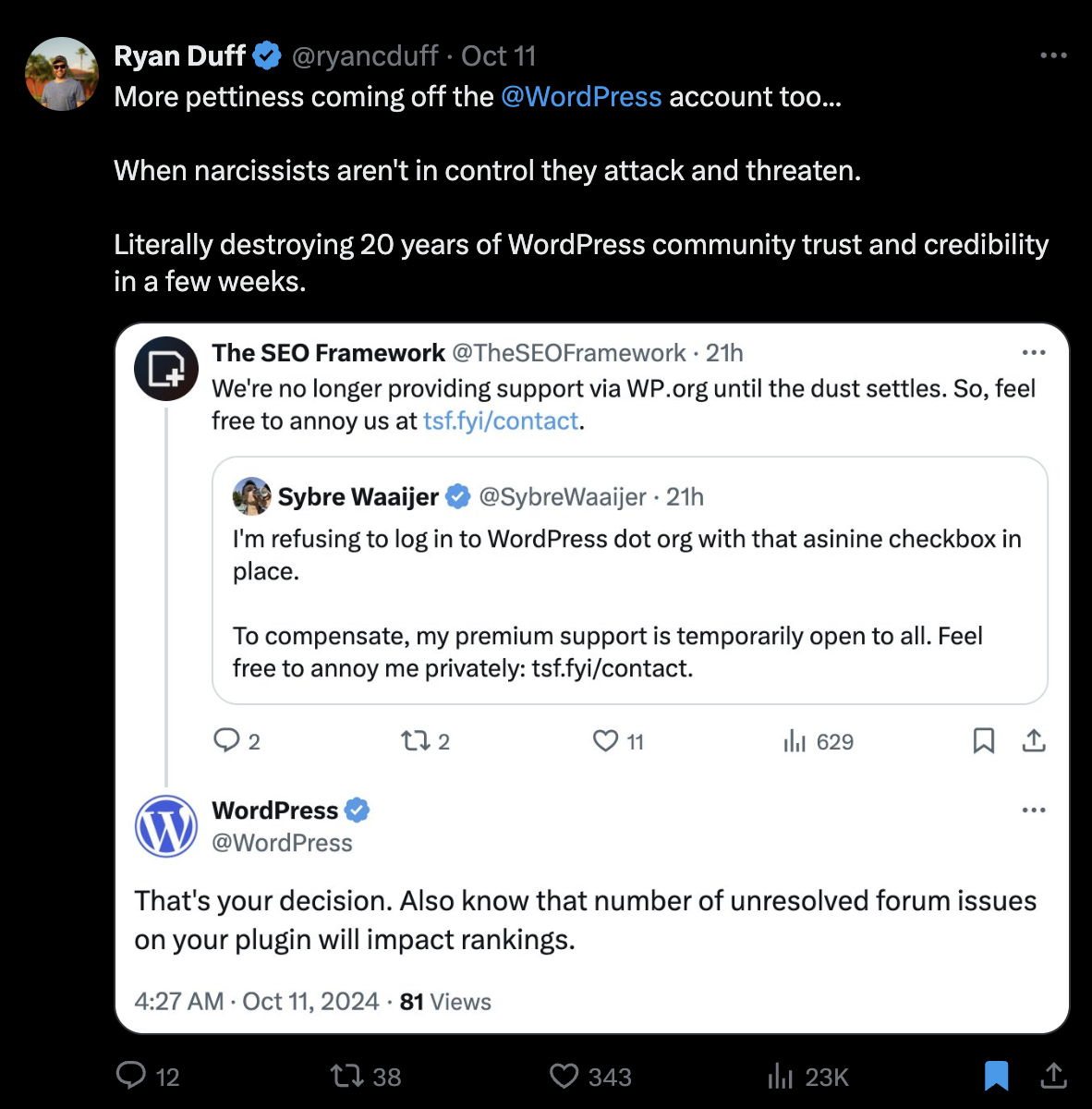
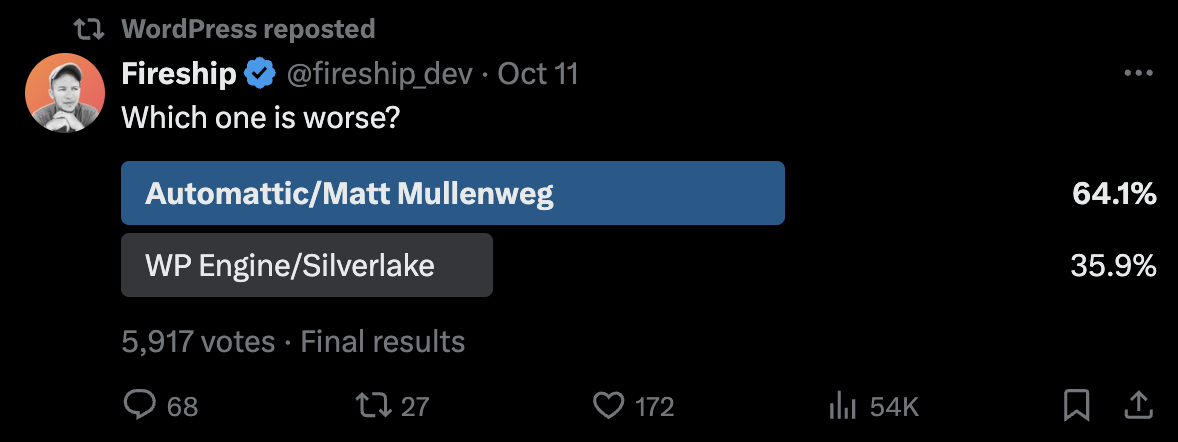
This one definitely did not age well. ^
Since the WordPress Foundation has also filed to trademark “Managed WordPress” and “Hosted WordPress”, contributors are fleeing the project fearing that backing it may bite them back.
The pushback from the community is nothing short of insane:
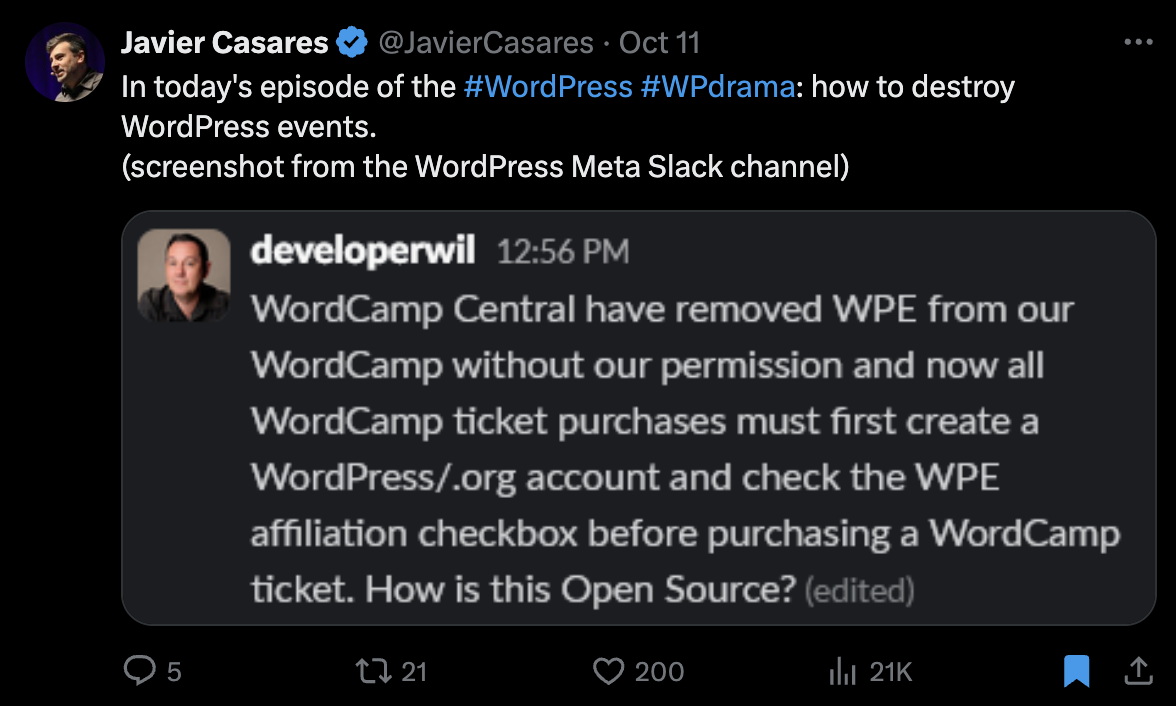
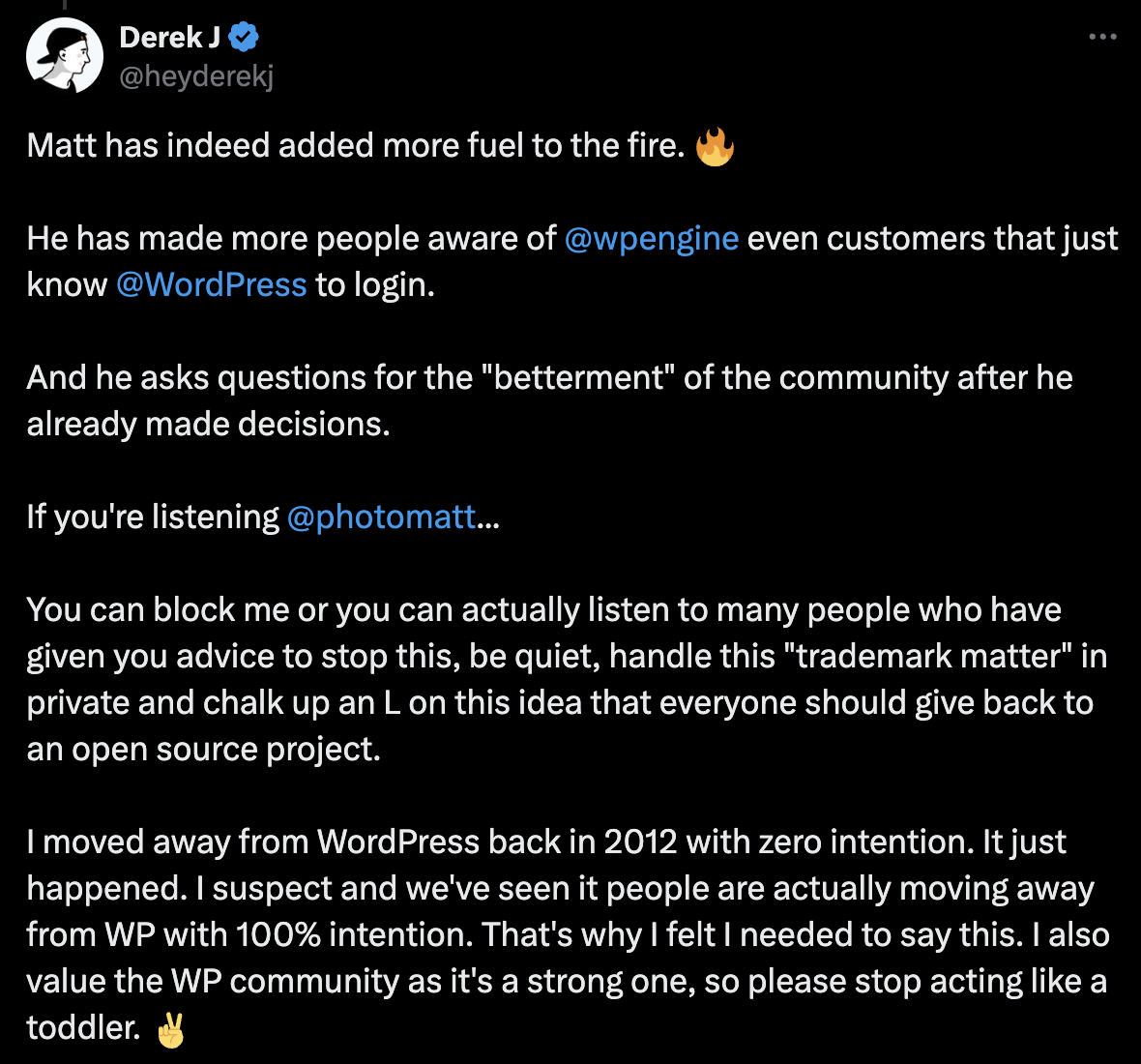
Where is WordPress Headed?
Even though Automattic continues to call the lawsuit filed by WP Engine baseless, internal dissatisfaction amongst the employees is too evident. In response to the conflict with WP Engine, Matt Mullenweg asked employees who disagreed with his stance to leave immediately, offering a severance package of $30,000 or six months’ salary, whichever was higher. As a result, 159 employees chose to resign.
Even with 8.4% of its workforce gone—many of whom were essential to the company’s operations, Matt couldn’t swallow his pride and in yet another blog post said “We designed the most generous buy-out package possible, which we called the Alignment Offer.”
He went on to explain: “HR added some extra perks to make the deal even more attractive. We wanted it to be as enticing as possible.” and, “159 people accepted the offer, representing 8.4% of the company, while the remaining 91.6% turned down $126 million in potential severance to stay!”
Ending Notes
As the legal turmoil between Automattic and WP Engine unfolds, the WordPress community is left questioning the future of the platform they’ve helped build. The open-source nature of WordPress has always been its greatest strength, fostering innovation, collaboration, and a sense of shared ownership, benefitting half of the internet we see today. However, recent developments have exposed deeply rooted issues within the ecosystem and raised concerns about the balance between commercial interests and community-driven ideas about many other open-source projects.
Last year, around the same time, we saw a similar conflict of interest with Terraform and its fork OpenTofu. It is evident that the influence of corporate entities leads to more centralized control and less input from independent contributors in scenarios like this.
The situation between Automattic and WP Engine highlights the delicate balance between community and commercialization in the open-source world. As WordPress moves forward, contributors globally will be on the lookout for how its leadership navigates these challenges, and whether the platform can continue to maintain the values that have made it an internet favorite.
References
Parts of this blog have been taken from TechCrunch’s article titled “The WordPress vs. WP Engine drama, explained”, which goes in-depth about the timeline of the controversy. Give it a read if you’d like to know more!
Updates
As of January 3, 2025 here are some notable updates on the case, courtesy Tech Crunch’s article referenced above, unedited:
Mullenweg and team opposed expedited hearing in a court document filed on October 21. They argued that the case is not about WP Engine’s access to WordPress, as the company already has access to “https://github.com/WordPress/WordPress” and they can choose to use it in any way.
“Rather than being about access to WordPress software, this case instead is about WordPress.org – a website owned and run by Defendant Matt Mullenweg individually, for the benefit of the community he loves,” the filing reads.
“WordPress.org is not WordPress. WordPress.org is not Automattic or the WordPress Foundation, and is not controlled by either. To the contrary, as Plaintiff itself acknowledges, WordPress.org is Mr. Mullenweg’s responsibility.”
On October 23, Judge Araceli Martinez-Olguin said the first hearing for primary injunction will take place on November 26 unless there is an opposition.
On October 30, Mullenweg and Automattic filed a motion to dismiss key accusations made by WP Engine on the basis that the company is responsible for harming itself.
“Despite its own (mis)conduct, WP Engine’s Complaint now asks this Court to compel Matt to provide various resources and support to private equity-backed WP Engine for free, in the absence of any contract, agreement, or promise to do so,” the court document read.
In reply, WP Engine filed a document citing Mullenweg’s comments on the TC Disrupt stage about how much business WP Engine lost.
Subscribe to my newsletter
Read articles from Aaishika S Bhattacharya directly inside your inbox. Subscribe to the newsletter, and don't miss out.
Written by

Aaishika S Bhattacharya
Aaishika S Bhattacharya
I am Aaishika, and I am experienced in developer relations and evangelism for technical organizations. My primary focus is helping future developers improve by harnessing the 3 Cs: Community, Code, and Content. Curating quality content brings me a lot of joy and in this space, I share informative and occasionally opinionated takes on technologies and trends.